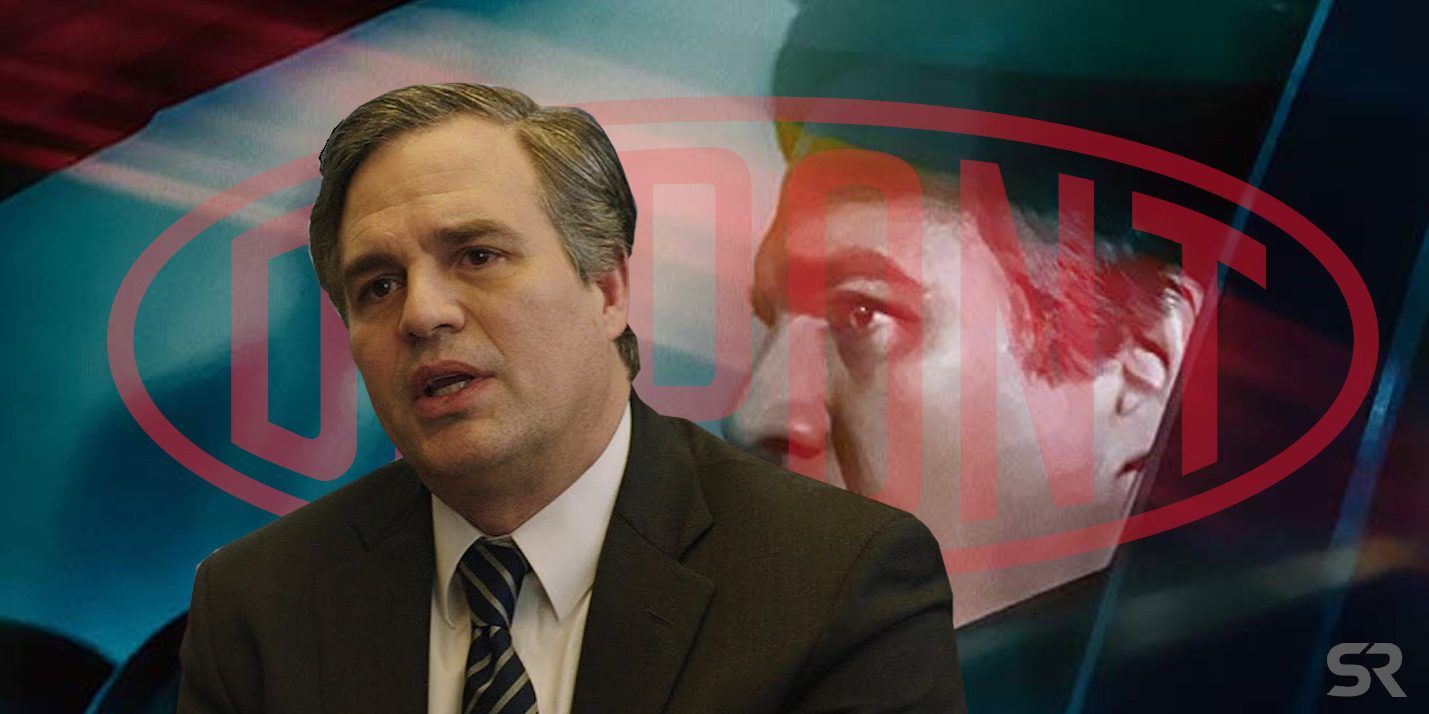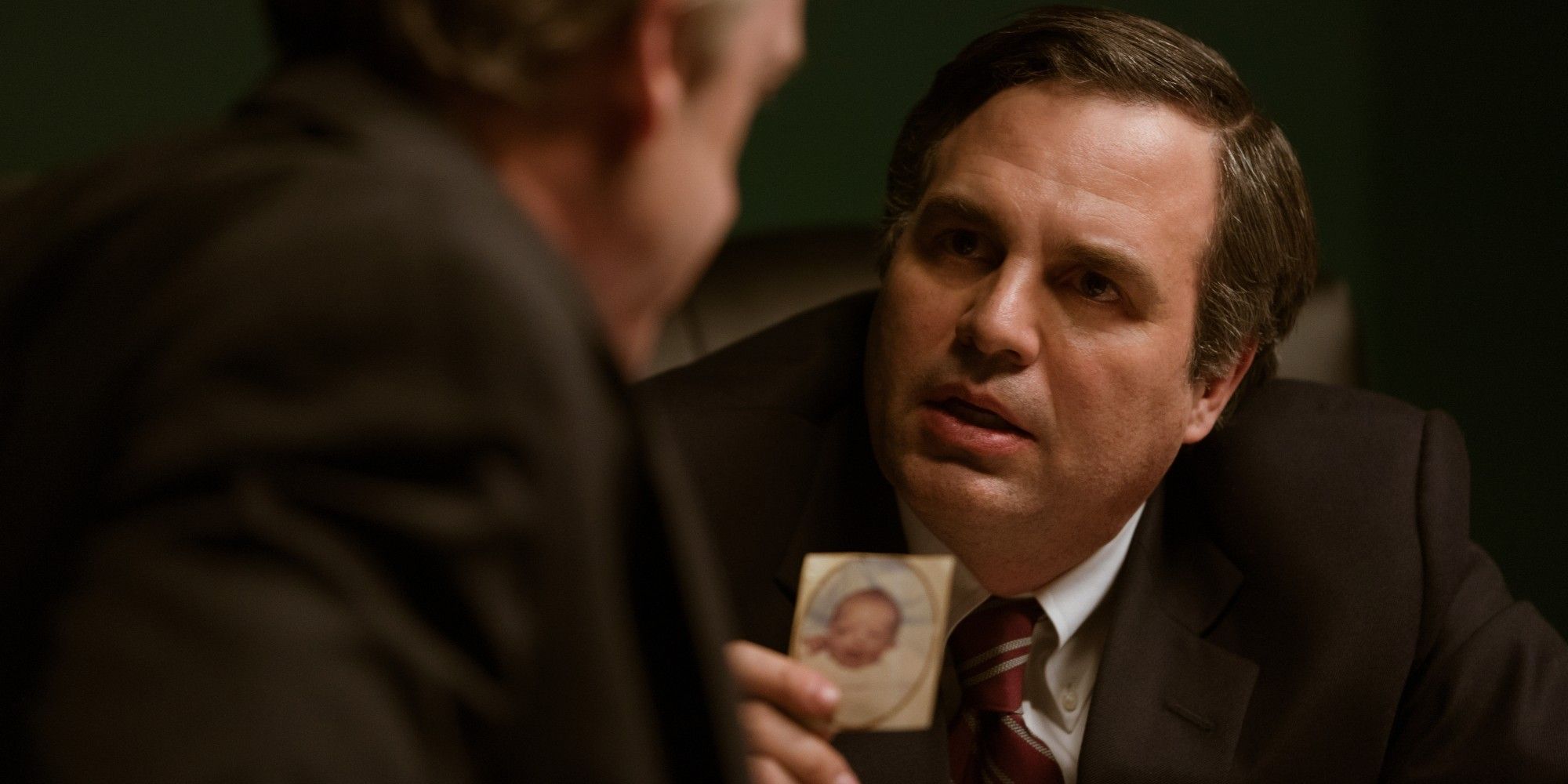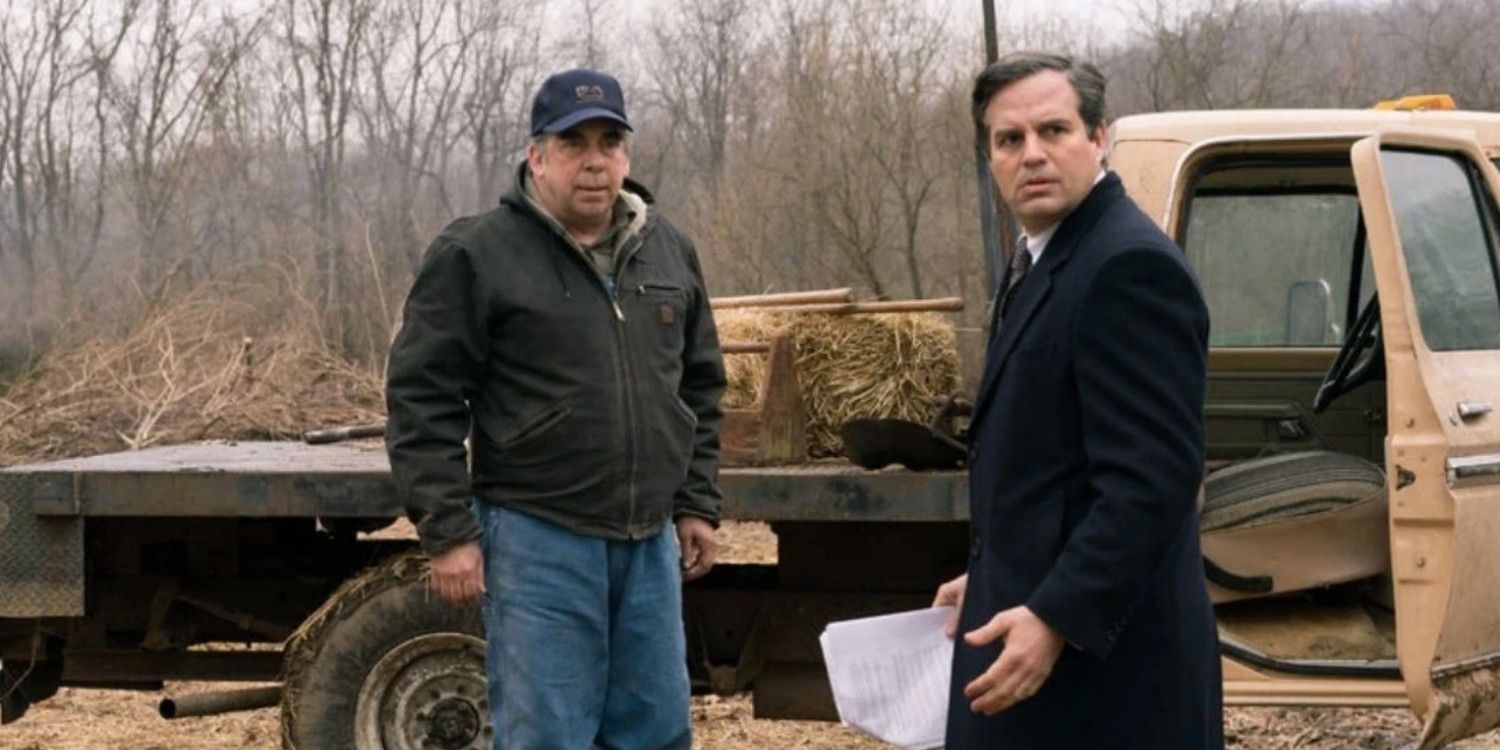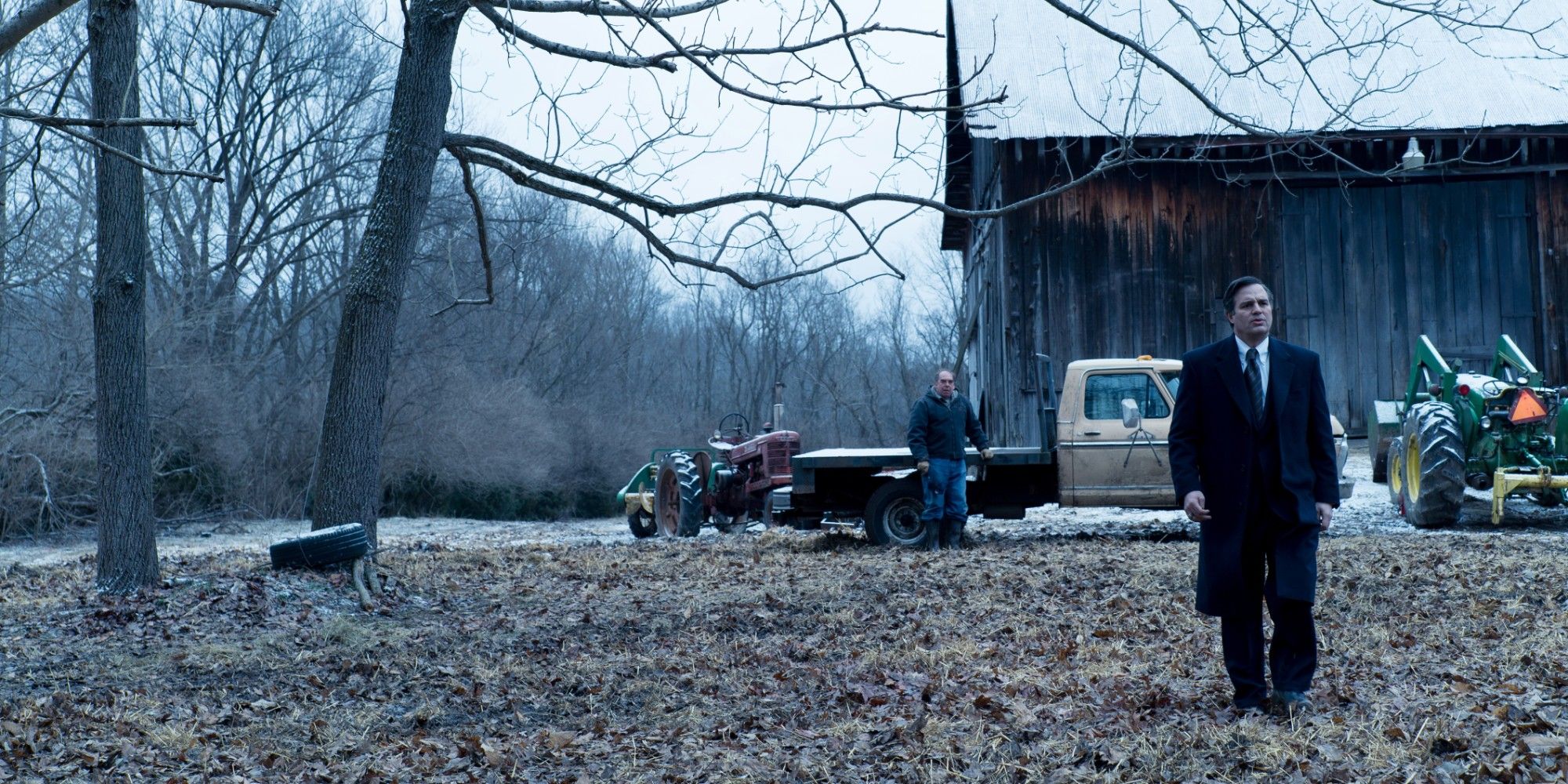Warning: The following contains spoilers to Dark Waters.
Todd Haynes' legal thriller Dark Waters tells the real life horror story of one man's quest to expose the DuPont company for releasing a toxic chemical into a small town's water supply – but how much of the Dark Waters true story actually happened, and how much of the it was glossed-up for the big screen? Following the nearly 20-year-long investigation of former corporate defense attorney Robert Bilott, the film stars Mark Ruffalo as Bilott, Anne Hathaway as his wife Sarah, Tim Robbins as his boss Tom, as well as Victor Garber, Bill Camp, and William Jackson Harper, among others.
A modern David and Goliath story, Dark Waters sees Robert acting out of nothing more than a sheer sense of righteousness. When West Virginia farmer Wilbur Tennant (Camp) arrives at the firm one day with a box full of video tapes, showing the extent to which the poisonous waters adjacent to a DuPont facility have been affecting his cattle, the Cincinnati lawyer agrees to look into it as a favor to his grandmother (whom Tennant is neighbors with). But once he understands the severity of the situation, the case becomes his highest priority.
As Robert's obsession grows, the other facets of his life - his work and even his family - slowly fade away. The real Robert Bilott was under an enormous amount of stress as a result of this landmark lawsuit, but how much of what is shown actually happened in the Dark Waters true story? And how much of it was adapted, or perhaps exaggerated for the big screen?
Who Is Robert Bilott?
Like in Dark Waters, Bilott began his post-school law career working on behalf of chemical companies for his employer, the Taft Stettinus & Hollister firm. During his time there, he would provide his clients with guidance on how best to comply with the "Superfund" law (or Comprehensive Environmental Response, Compensation, and Liability Act) which, passed by Congress in 1980, regulated sites that were tainted by hazardous substances. So, at one time, Bilott did have a good, business relationship with companies like DuPont and some of their highest executives. It almost goes without saying that once the investigation began, as the film portrays, that relationship was quickly squashed – though the scene in which DuPont executive Phil Donnelly (Garbert) hisses "f*ck you, hick," was invented.
In terms of Robert's dedicated and kindhearted personality, the article around which Dark Waters was based – Nathaniel Rich's 2016 New York Times Magazine feature "The Lawyer Who Became DuPont's Worst Nightmare" – seems to confirm that the film did right by him. It's also true that Billot didn't have the same Ivy League upbringing as many of his Taft colleagues, having been raised on Air Forces bases around the United States and West Germany. However, according to trial lawyer Harry Deitzler (played by Bill Pullman in the film), one thing the real Robert did not do, despite all of the stress brought on by the lawsuit, is turn to the bottle. "I don't recall him drinking," he told Slate. "I noticed that in at least one of the scenes where I was portrayed...everyone appeared to be drinking. That's Hollywood, I guess."
In addition to his personality, Dark Waters' portrayal of the physical toll the decades-spanning legal battle took on Robert's health is also fairly accurate. As seen in the film, Billot did begin to experience strange symptoms in 2010 similar to the stroke-like attack Mark Ruffalo reenacts. In his memoir, Exposure: Poisoned Water, Corporate Greed, and One Lawyer's Twenty-Year Battle Against DuPont, Bilott says that after an MRI (which is shown in the movie), doctors could only really diagnose the issue as "unusual brain activity."
What Happened At The Tennant Family Farm?
Given the fact that the events depicted on the Tennant cattle farm in Parkersburg, West Virginia, are Dark Waters' most important evidence, the filmmakers should have treated them with the utmost authenticity – to their credit, they did for the most part. Wilbur Tennant's brother Jim really was a DuPont employee who got sick with a disease the doctors couldn't diagnose; and the chemical company did convert Jim's 66 acres of the family's 600-acre property into a sludge marsh for acidic and toxic chemicals.
As Dark Waters makes perfectly clear, DuPont was not ignorant of the effects their actions could have on the environment. In fact, nearly a decade before they would be blaming Tennant's farming abilities in court for the harm done onto his cows, the company conducted internal tests for PFOA (perflurooctanoic acid). Upon evaluating the results, DuPont secretly expressed concern for the health of for the livestock, whose symptoms – as seen in the film – included blackened teeth, bloated organs, and sudden aggression.
Like Bilott, the stress of the situation did get to Wilbur Tennant as well. So much so that he and Bilott would occasionally have spats at one another, though they were both, ultimately, on the same team. Robert acknowledged the fact that Wilbur's constant refusal to simply take the money and run was a driving force for him to stay involved in the case.
As seen in Dark Waters, Wilbur's adamance did get him in trouble with DuPont. As it turns out, one of the film's more frightening sequences – in which the Tennant farm is being stalked by a low-riding helicopter until Wilbur scares it away with his rifle – did actually happen. As Robert explained in Exposure, DuPont sent a photographer to take aerial photos of the property as part of its legal defense, and when Wilbur came out with his gun, the company's lawyers reached out to the farmer and told him that the pilot was going to pursue the incident with federal authorities. That being said, though DuPont did conduct walkthroughs and searches of the Tennant's belongings, there was never any record that indicated Tennant's evidence had gone missing.
What Else Did DuPont Do?
As shocking and as sad as it may sound, in the 1960s, DuPont really did offer some of its staff Teflon-laced cigarettes to test the potential side effects of PFOA. The results found that 9 out of the 10 employees unknowingly studied upon grew noticeably ill, experiencing flu-like symptoms that included chills, backache, fever, and coughing. Similarly, DuPont's secretly malicious presence in Parkville is accurate to the way in which both the company interacted with its host cities, as well as how the majority of the community put total trust in them. Citizens in the Oho and West Virginia 'Chemical Valley" regions really were too impressed and grateful by the economic benefits to question whether or not their actions would have an impact on the citizen's health and security.




